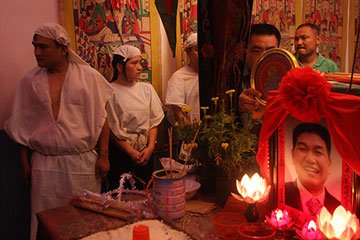
A memorial service in Yangshi for Zeng Chengjie.
(4 of 4)
Zeng wasn't given a chance to make good on his promises. Jishou authorities confiscated his company's assets and sold them to a state-owned enterprise for about $54 million, according to a court document provided by Wang. Zeng's many creditors lost millions. They were only partly compensated for the money they lent him. Zeng's wife Deng Youyun, chairwoman of his company, was sentenced to 5 1/2 years in prison, and his elder daughter Zeng Zheng, one of the firm's accountants, to seven. They both remain in prison today. (TIME requested interviews with the Jishou city government office responsible for dealing with illegal financial activities and with the propaganda department of the Changsha court to discuss Zeng's case, but they did not respond.)
Throughout the trial and subsequent appeal, Zeng rotted in prison. He was not allowed visits from his family, though Chinese law permits them, according to Wang. Zeng complained of his poor treatment in a 2013 letter from prison to his lawyer. "The guards launch crackdowns on the jailhouse bullies from time to time; otherwise, I might have been beaten to death by them," he wrote. "My hands and feet are shackled, and I do not have enough exercise and nutrition. I have suffered constant chronic illness for a long time. I have deep concern that I will die of the diseases in prison one day." But Zeng tried to keep his spirits up. Given that he had so far survived, "perhaps God has been blessing me."
The last time Wang saw Zeng was last year in late May. The Beijing lawyer says he found Zeng with his hands and feet chained together, leaving him unable to stand, and weak from lack of food. Wang had come with good news — he figured he had new evidence that could help Zeng's case. But Zeng was grim. He told Wang that his guards had warned him his execution was imminent. Wang assured Zeng that was impossible: the death sentence, the lawyer told his client, could not be carried out so long as he was submitting evidence to the court. But Zeng had lost hope. "It is too late," he told his lawyer despondently. "You can't save me."
Into Darkness
Zeng was right. Just weeks later he was dead. Wang says he was not informed that the Supreme People's Court had signed off on Zeng's execution. According to Wang, Chinese law mandates that the court should have formally notified him of that decision, but he never got a copy of the final judgment. In November, four months after the execution, the court posted the document on the Internet, a highly unusual move that, Wang speculates, was an attempt to justify Zeng's death to a skeptical public.
Why was Zeng prosecuted for financial practices that are common in China? How could officials tolerate these business dealings one moment, and execute a man for them the next? Maybe the reason was Zeng's defiance. By professing his innocence to the bitter end and refusing to repent, he may have angered those in authority. Perhaps he was killed as a warning to others who dabble in the financial underground. Or maybe the scale of Zeng's activities was simply too great, in the minds of officials, to allow for leniency.
In Yangshi village, the residents have no doubt about Zeng's innocence. In their eyes, he remains nothing more than the local boy with big dreams. More than 1,000 people attended his funeral in his family house along Chengjie Happiness Road to pay their final respects before his ashes were buried on a nearby mountainside. "A good man died," says Liu, his former neighbor. In Jishou, the many who participated in Zeng's scheme blame their local government for what happened, not Zeng. "We don't hate Zeng," says Li Songquan, an ex-official in the local business chamber who says he lost about $190,000 in the city's shadow-banking fiasco. "If he weren't arrested, he would have had enough money to pay the creditors back." To retiree Yang Zhongshun, another Zeng creditor in Jishou, the businessman's ordeal reflects the core of injustice in China today: "Officials are more powerful than the law."
That may be the key truth to emerge from Zeng's story. "We should say no to those law-enforcement departments that infringe upon law, property and life," Wang Shi, the founder of Vanke, one of China's largest private real estate developers, boldly protested on social-media site Sina Weibo in response to the Zeng case. Yang Jinzhu, a Changsha lawyer who wrote on his blog that Zeng's execution was "against humanity and totally unacceptable," hits the point home. "If we do not speak for Zeng today," he warned, "no one will speak when what happened to him falls upon us."
— with reporting by Gu Yongqiang / Beijing
